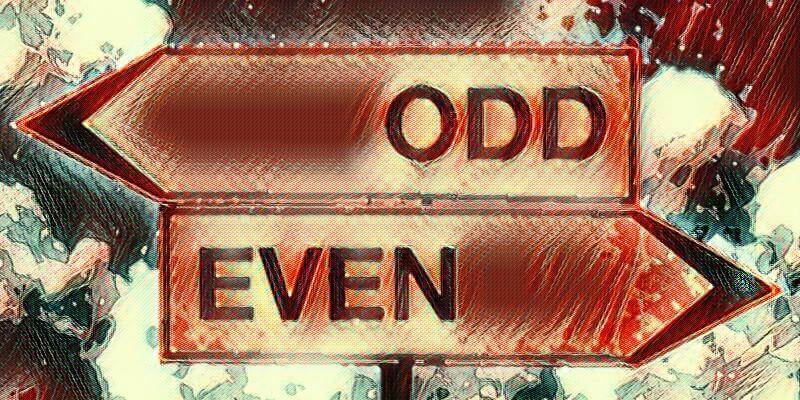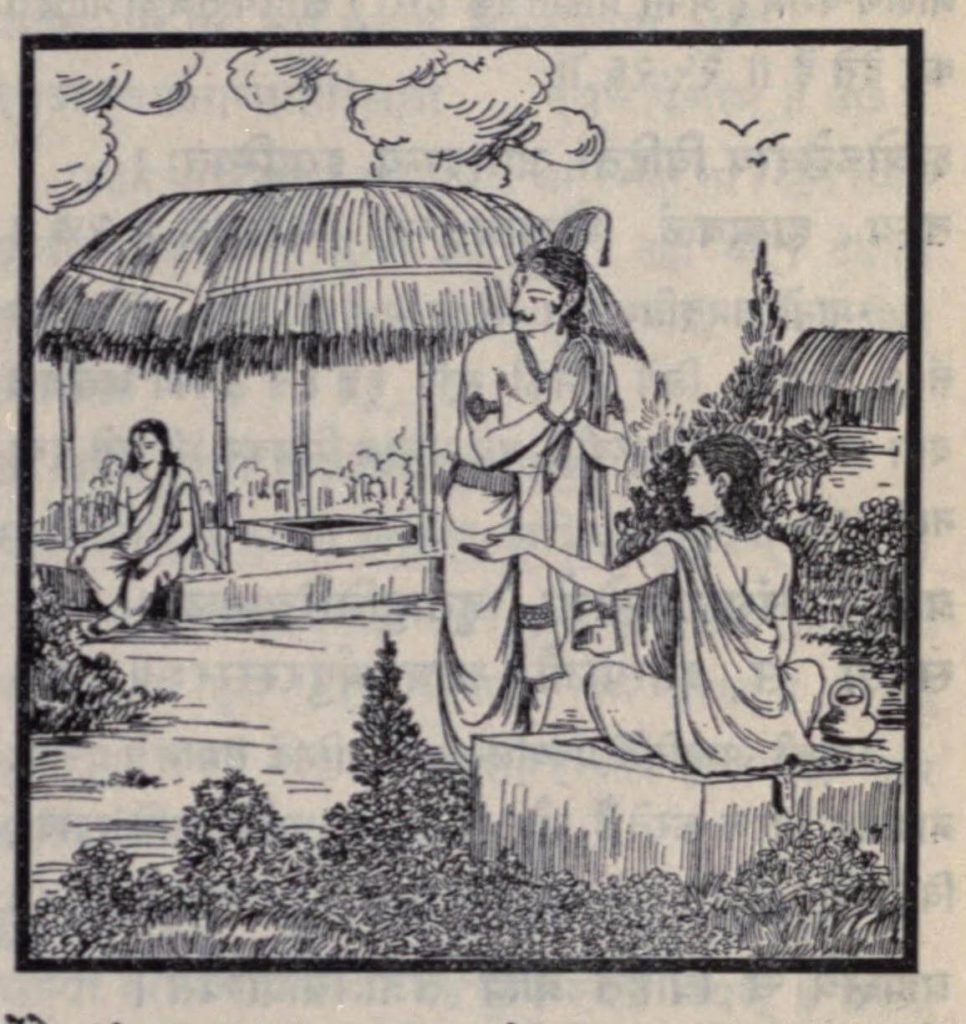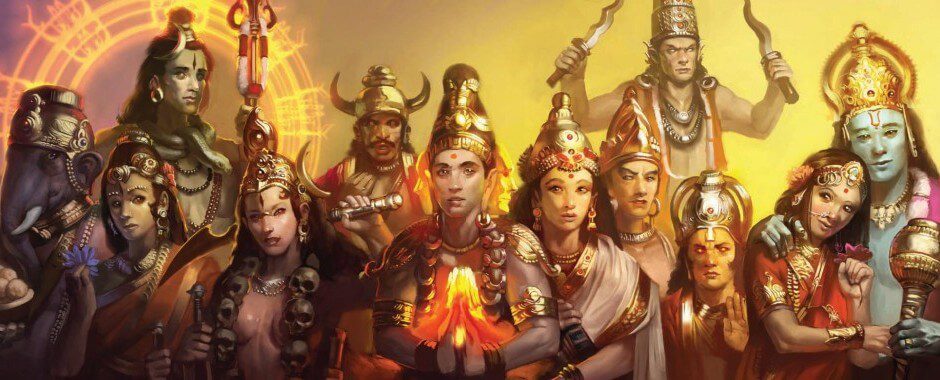Enakshi critiques Hindu mythology and finds several flawed moral values. An exclusive for Different Truths.

If you are asked why does the moon have spots on its surface that are visible from Earth even to the naked eye, what would be your answer? Would you say that those spots indicate the various dents created on the surface of the moon because of the asteroid attacks or would you say that those marks remind us of how Chandra betrayed his Guru Brahaspati by stealing his wife, Tara, and then impregnating her with his ‘seed’? If you would choose the latter, then this article is not for you.
The mystical and baffling characters that exist in the myth robbed me of the peace of mind because of their stories. While we are taught right from our childhood to be like Lord Ram, his story shows how he paltered with Sita when she warned him of the consequences that lay ahead following the accidental killing of Soorpnakha’s son by Lakshman.
Recently, I finished reading a very good book (good in terms of the fluid narrative and easy comprehension) on Hindu mythology. It has abridged versions of the stories of Draupadi, Kunti, Kaikeyi, Jabala, Diti, Aditi, Sanjana, etc. The mystical and baffling characters that exist in the myth robbed me of the peace of mind because of their stories. While we are taught right from our childhood to be like Lord Ram, his story shows how he paltered with Sita when she warned him of the consequences that lay ahead following the accidental killing of Soorpnakha’s son by Lakshman. This is just one example. Our elders urge us to follow the footsteps of sages and the saints who had the power of gaining wisdom and knowledge through mediation. What our elders fail to tell us is about their belief in polygamy and patriarchy. One such example is that of sage Ugrashrava who, in spite of being handicapped, disrespected his wife, Sheelawati, and instead wanted to spend a night with another woman.

Another ‘value’ that these mythological tales teach us is that of infidelity. Whether it is Brahaspati’s wife, Tara, who betrays her husband and elopes with Chandra or Sanjana, Surya’s wife, who asks her clone/ shadow to be with Surya so that the former can be alone in a deep, dark forest, every story has characters that toe the line of ethics and do things that are not considered ‘good’ by the present ‘society’. These tales also have a conclusive end to the debate between monogamy and polygamy, for most of the mythological characters advocate polygamy. In fact, Krishna, the most adored God gave his consent to polygamy when he convinced Draupada, Draupadi’s father, to agree to the marriage of his daughter to five men. Kunti was no less. Call her a victim of fate or a victim of her desires, her decision to bear children of different Gods/ men was the one that led to the pandemonia in the first place. Pandu, Kunti’s husband, could not procreate and that fuelled Kunti’s need to use her boon. She had Karna from Surya, Yudhishthira from Dharmaraja, Bhima from Vayu and Arjuna from Indra (son). When Pandu’s thirst for more children wasn’t quenched yet, he demanded Kunti to call another God but she refused to say, ‘I cannot do that. Dharma decrees that a woman can go to four men, at the most. If I go to a fifth, I will be called a ‘whore’.’ I couldn’t help but mentally applaud her reasoning!
Be it infidelity, polygamy, political bigotry, conspiracy or murder, honour killing and deceit — all these ‘values’ are deeply rooted in our mythology. When we are forced to read the Ramayan and the Mahabharat, we are expected to look at the one-dimensional characters. The moment we question their actions and their reasons, we are rebuked and asked to follow what’s right. Our apprehensions are never satiated.
Be it infidelity, polygamy, political bigotry, conspiracy or murder, honour killing and deceit — all these ‘values’ are deeply rooted in our mythology. When we are forced to read the Ramayan and the Mahabharat, we are expected to look at the one-dimensional characters. The moment we question their actions and their reasons, we are rebuked and asked to follow what’s right. Our apprehensions are never satiated. Rather we are made to believe notions that do not have a strong base. Why doesn’t anyone point out Ravana’s decision of killing Soorpnakha’s husband because he was no match to the former’s status? Why doesn’t anyone question the flawed character of Shiva who planted his ‘seed’ in Agni rather than his wife ‘Parvati’ when he was interrupted during the lovemaking? Why doesn’t anyone question the incomprehensible desire of the men to have umpteen number of children? Why doesn’t anyone talk about the patriarchal society where women were merely considered to be a two-legged womb?
There are too many questions and few answers. We read Satyanarayan Katha in which it is openly proclaimed that the one who begs, pleads and worships the lord will be granted blessings. Isn’t that wrong? Aren’t we made to believe that God helps all those who are honest and virtuous? Mythology means a story that is based on myths. Then why do we follow the principles laid out by those stories so religiously that we fight tooth and nail with other humans and several are killed because of a trivial matter like that of Mandir and Masjid?
I cannot change the beliefs that are embedded deep within the conscience. What pains my heart is the fact that even education doesn’t help many because they choose to be ignorant and oblivious. Raising eyebrows or questions has never been approved in our society. But I wonder for how long we will continue living behind the facade of dharma and karma!
PS: These views are personal and are not intended to offend the sentiments of anyone in any way. The stories mentioned are based on ‘Boons and Curses’ by Yugal Joshi.
Photos from the Internet





 By
By
 By
By
 By
By